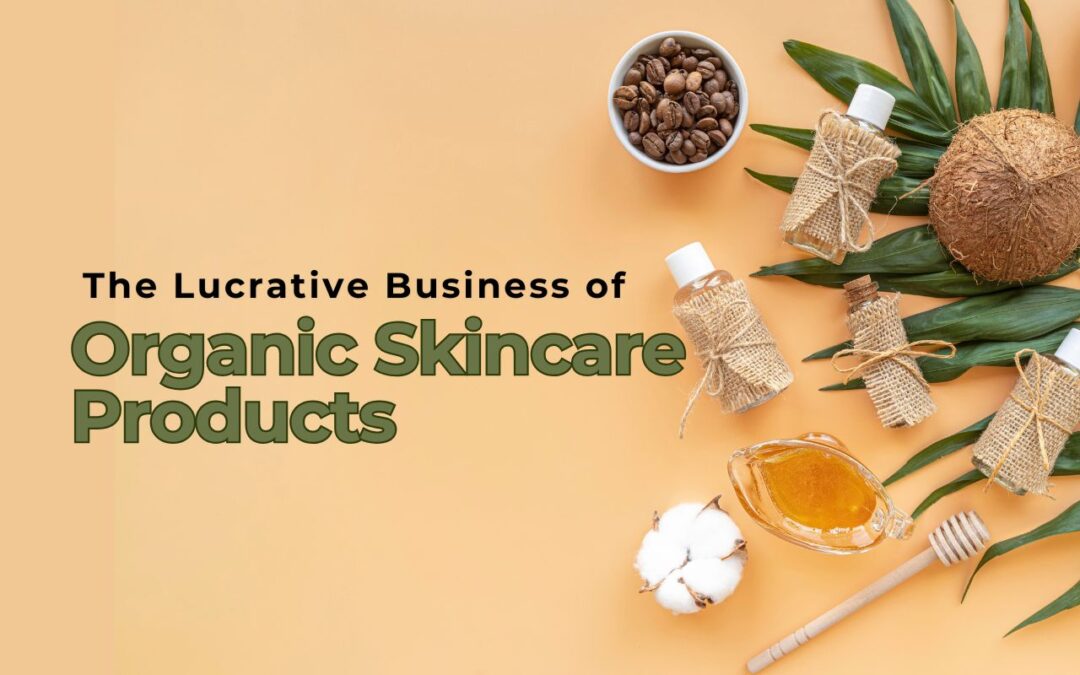In recent years, the global skincare industry has undergone a massive transformation. What was once a market dominated by chemical-based formulas and artificial enhancements has now evolved into a domain driven by clean, green, and sustainable beauty practices. Among the most prominent changes is the rise of organic skincare products—a trend that has not only captured the hearts of conscious consumers but has also proven to be a goldmine for savvy entrepreneurs and investors.
This shift toward organic alternatives is not just a passing fad. It’s part of a broader movement that emphasizes health, sustainability, and ethical production. For those looking to start or grow a business in this space, the potential is enormous. Let’s dive deep into why the organic skincare market has become so lucrative and how you can tap into its many opportunities.
The Rise of Conscious Consumerism
Today’s consumers are more informed than ever before. With instant access to research, reviews, and health data, people are increasingly scrutinizing the products they use on their skin. They care about ingredients, sourcing, production methods, and the long-term effects on both their health and the planet.
This wave of conscious consumerism has made organic skincare products more desirable than traditional alternatives. Consumers now demand formulations that are free from synthetic chemicals, artificial fragrances, parabens, and sulfates. They want products made with plant-based, naturally derived ingredients that promote skin health without adverse side effects.
The shift has been particularly pronounced among younger generations. Millennials and Gen Z, in particular, are driving demand for transparency and authenticity in the products they buy. For these consumers, choosing organic isn’t just a preference—it’s a lifestyle statement.
Why Organic Skincare is Big Business
Several factors contribute to the profitability of organic skincare, making it a highly attractive industry for entrepreneurs and investors alike.
1. High Market Demand
The global demand for organic skincare has been increasing steadily over the past decade. With consumers becoming more wellness-focused, they are turning to products that align with holistic health practices. Organic skincare fits perfectly into this narrative, offering benefits that extend beyond mere aesthetics.
Not only does this demand ensure a stable customer base, but it also allows for premium pricing. Consumers are willing to pay more for organic, ethical, and sustainable products, giving businesses the opportunity for higher margins.
2. Scalability and Diversification
One of the greatest advantages of starting a business in the organic skincare sector is the ability to scale and diversify easily. Entrepreneurs can begin with a few core products and gradually expand into a full range of skincare solutions, including cleansers, toners, moisturizers, serums, and masks.
Moreover, the product line can be further diversified based on skin types, specific concerns (such as acne, aging, or sensitivity), and even seasonal changes. This not only increases the lifetime value of each customer but also opens doors to a broad market base.
3. E-commerce and Direct-to-Consumer Growth
The digital revolution has made it easier than ever to reach customers directly. E-commerce platforms have enabled small skincare brands to thrive without the need for large-scale retail distribution. By leveraging social media and content marketing, businesses can build a loyal community and create a direct relationship with their customers.
Direct-to-consumer sales also offer the benefit of data collection and customer feedback, which can be used to refine products, improve experiences, and tailor marketing strategies.
Challenges and Barriers to Entry
Despite its profitability, the organic skincare industry is not without challenges. Understanding and navigating these barriers is crucial for long-term success.
1. Ingredient Sourcing and Authenticity
Sourcing truly organic and ethically harvested ingredients can be complex. Suppliers must adhere to strict standards to ensure ingredients are free from pesticides, synthetic chemicals, and genetically modified organisms. The process of verifying these claims often involves third-party certifications, which can be both time-consuming and costly.
Additionally, maintaining ingredient consistency is essential. Variations in quality can lead to ineffective products or customer dissatisfaction.
2. Formulation and Shelf Life
Organic products often avoid synthetic preservatives, which can limit their shelf life. Developing formulations that are both effective and stable requires expertise in cosmetic chemistry, which may necessitate hiring specialists or investing in R&D.
Product testing also becomes critical, not just for safety but for maintaining customer trust and avoiding legal issues.
3. Regulations and Compliance
The term “organic” is regulated differently depending on the country or region. Misuse or mislabeling of this term can lead to legal penalties and a loss of brand credibility. Navigating these regulations requires a deep understanding of labeling laws, permissible claims, and documentation requirements.
Strategies for Succeeding in the Organic Skincare Business
Success in the organic skincare industry depends not just on having a great product but also on how you position and market your brand. Here are key strategies that can drive growth and profitability:
1. Storytelling and Transparency
Consumers are drawn to brands that are open about their processes and values. Sharing the story behind your ingredients, your production methods, and your commitment to sustainability can build strong emotional connections with your audience.
Transparency also means being honest about what your products can and cannot do. Over-promising can lead to customer dissatisfaction and negative reviews, whereas realistic claims foster long-term trust.
2. Community Building
Organic skincare buyers often form tight-knit communities around wellness and clean beauty. Engaging with these communities through educational content, tutorials, webinars, and social media can help establish brand loyalty.
Offering value beyond the product—such as tips on healthy skin routines, ingredient benefits, or mindfulness practices—can position your brand as a trusted authority in the space.
3. Personalization and Customization
Modern consumers value personalized experiences. Offering skincare consultations, skin assessments, or customized product bundles can make your brand stand out in a crowded market. Personalized experiences not only increase customer satisfaction but also allow for upselling and repeat purchases.
4. Sustainable Packaging
In the organic world, packaging matters almost as much as the product. Plastic-free, biodegradable, or refillable packaging options can enhance your brand image and appeal to eco-conscious customers.
Businesses that align their packaging practices with their organic and sustainable brand message often gain a competitive edge.
Future Trends in Organic Skincare
The future of organic skincare is ripe with innovation and evolution. Understanding these trends can help businesses stay ahead of the curve:
1. Tech-Integrated Skincare
As technology continues to merge with wellness, expect to see more integration of digital tools for skin diagnostics and personalized product recommendations. Even in the organic space, AI and data analysis will play a role in optimizing the customer experience.
2. Minimalist and Multi-Use Products
Consumers are embracing simplicity. Skincare routines with fewer, more effective products are becoming the norm. This shift favors minimalist formulations that serve multiple purposes, such as a moisturizer that also functions as a sunscreen or primer.
3. Local and Small-Batch Production
Locally made, small-batch products are gaining popularity for their perceived freshness and artisanal quality. Consumers are more willing to support local businesses that produce in small quantities with great care and attention to detail.
4. Focus on Inner-Outer Wellness
Organic skincare is increasingly intersecting with wellness philosophies that promote internal health as a reflection of external beauty. Products infused with adaptogens, probiotics, and superfoods are becoming more common as consumers look for skincare that supports whole-body health.
Conclusion
The organic skincare industry represents a dynamic and profitable frontier for entrepreneurs, innovators, and investors. As demand for clean, ethical, and effective skincare solutions continues to rise, so too does the opportunity to build successful, sustainable businesses in this space.
However, profitability in the organic skincare market is not guaranteed. It requires a commitment to quality, transparency, and customer education. Those who enter the market with a clear vision, a strong brand story, and a focus on delivering genuine value will be well-positioned to thrive.
The future of skincare is not just skin deep. It’s rooted in the values of wellness, sustainability, and conscious living. For those who embrace this vision, the rewards—both financial and personal—can be truly remarkable.
FAQs
Q: Why are organic skincare products more expensive than regular products?
A: Organic skincare products often use high-quality, natural ingredients that are more expensive to source and process. Additionally, they may avoid synthetic preservatives, require more frequent production, and follow stricter quality and ethical standards, all of which contribute to a higher price point.
Q: Is the organic skincare market saturated?
A: While competition is growing, there is still significant room for innovation and differentiation. Unique formulations, personalized customer experiences, and strong brand values can help new entrants stand out in a crowded marketplace.
Q: How can I start my own organic skincare business?
A: Start by researching target markets, sourcing reliable organic ingredients, developing safe and effective formulations, and ensuring compliance with relevant laws and labeling guidelines. A strong digital presence and community engagement are essential for growth.
Q: Are organic skincare products safer than synthetic ones?
A: Organic products often avoid harsh chemicals and are perceived as gentler on the skin. However, “natural” doesn’t always mean “safe” for everyone—some natural ingredients can cause allergies or sensitivities. It’s important to patch test and understand individual skin needs.
Q: What’s the future of organic skincare?
A: The future includes more sustainable practices, personalized solutions, technology integration, and a stronger connection between skincare and holistic wellness. Brands that adapt to these trends will likely lead the industry forward.













